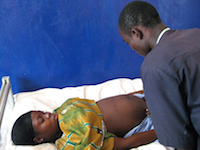ZWEDRU, Liberia, Jul 14, 2010 (IPS) - Henry Teh gently slides down a blue hospital sheet to expose the bare belly of a pregnant woman. As he pokes around to feel the position of the foetus, the midwife-in-training knows he is breaking tradition and changing the face of obstetric care in Liberia.
"In our setting, there are some women who are not really comfortable with men to check them... because of the private parts," he says, fiddling with his stethoscope.
In 2009, Teh became one of the first men to be admitted to a midwifery training program in Liberia's southeast. The rural midwifery school, closed for 20 years due to war, was reopened by the British medical aid agency Merlin and Liberia’s Ministry of Health and Social Welfare.
Shortage of qualified trainees
School officials quickly discovered that there was a shortage of qualified female candidates in the remote region. Few young women in Liberia graduated from high school in the past few decades because parents preferred to send their sons to school.
The decision to recruit men seemed to make sense, said midwifery trainer Sawah Shaffa. "[Liberia] has got male doctors. They got male nurses. So, midwifery should not be limited to only women."
At the Martha Tubman teaching hospital in Zwedru, Teh invites another pregnant woman to lie down on the exam table. The young man explains how he jumped at the opportunity to become a midwife because of a personal tragedy - his 19-year old sister died giving birth while stranded in the bush.
"She was trying to walk from the nearby town to Kanweaken, where we have the clinic. She started bleeding severely and there was no car available."
Villagers loaded the pregnant woman into a hammock to carry her to the next town, but she died on the road before an ambulance could arrive.
A 2009 report by the United Nations Children’s Fund (UNICEF) indicates Liberian women have a 1 in 12 lifetime risk of dying from pregnancy or childbirth complications, usually due to obstructed labor, haemorrhage, or infection, resulting in the eighth highest maternal mortality rate in the world.
UNICEF concludes that 80 percent of maternal deaths could be prevented by access to trained health workers.
Liberia has roughly 3.8 million people but just 400 trained midwives. Health officials say another 1,200 midwives are needed.
But whether the male midwife experiment will be successful is still in question.
Overcoming cultural obstacles
In the packed hospital waiting room in Zwedru, a young pregnant woman winces in pain and clutches her belly. Aletha Cherley, 22, is nervous because it’s her first pregnancy but, although she’s feeling cramps and back pain, she is reluctant to let Henry Teh examine her.
"For me, if a different man who is not my boyfriend sees my private parts, I can be too ashamed. ...It’s very shameful to me. That’s why they have ladies here to do that," says Cherley.
"You know, midwife means somebody to stay with a woman for long. And most women will not feel comfortable for another man to be with them until they deliver," agrees Kenyan midwife Zeena Abdalla Ramadhan, Merlin’s training coordinator.
"Midwifery is something private... it’s woman to woman."
Fifty-six-year Abdalla, known by all as "Mama Zeena," has spent nearly half her life training midwives in Sudan, Chad and Kenya’s Kakuma refugee camp. She knows there are cultural barriers to introducing men into the traditional field of midwifery.
"In South Sudan, they can only call a man when the woman has failed. Then the man will come with a spear to remove a baby, a stuck baby. Still, woman has to be around."
Can trained men fill gap?
Mama Zeena trained as a midwife after losing her own full-term baby in 1987. Today, she has become a vocal advocate for training more skilled birth attendants in poor, post-war states.
She warns that the Millennium Development Goal of reducing the world’s maternal mortality rate by three quarters by 2015 and providing universal access to reproductive health cannot be met without greater investment.
In Liberia, she has wrangled with the question of whether training a male midwife is of any use if gender issues prevent pregnant women from seeking their expertise. The decision is made more difficult because male applicants score highest on the entrance exam.
"If we had just gone only with the grades, we could have ended up having only men... But [community members] raised the concern. We cannot train people who will not be useful. So, we decided, let’s not consider more men."
The school reduced the number of male midwifery students accepted in 2010 to just two. Mama Zeena does not know what will happen next year.
Back in Henry Teh’s exam room, the young man places his ear against a fetal scope shaped like a horn, and presses it against the pregnant woman’s belly to listen to the foetal heartbeat. Teh, who was charging cellphones to earn money in his small village last year, beams with pride as he describes how much he loves training to become a midwife.
Unlike school officials, he’s confident pregnant women will overcome their shyness and cultural taboos to seek medical care from him in the village.
"I love this field so much... and you just have to approach women in a manner that you think she will be comfortable."
The first class of 32 midwives, who will graduate in December 2010, have signed contracts with the Ministry of Health that guarantee them a full-time job for three years, to be served across six rural counties in southeastern Liberia.

No comments:
Post a Comment